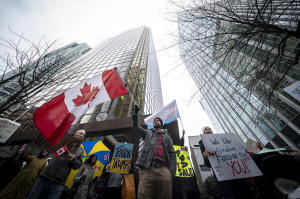Ontario slaps 25% tax increase on electricity exports to US in response
to Trump's trade war
[March 11, 2025] By
ROB GILLIES
TORONTO (AP) — Ontario's premier, the leader of Canada’s most populous
province, announced that effective Monday it is charging 25% more for
electricity to 1.5 million American homes and businesses in response to
U.S. President Donald Trump's trade war.
Ontario provides electricity to Minnesota, New York and Michigan.
“I will not hesitate to increase this charge. If the United States
escalates, I will not hesitate to shut the electricity off completely,”
Ontario Premier Doug Ford said at a news conference in Toronto.
"Believe me when I say I do not want to do this. I feel terrible for the
American people who didn't start this trade war. It’s one person who is
responsible, it’s President Trump.”
Ford said Ontario’s tariff would remain in place despite the one-month
reprieve from Trump, noting a one-month pause means nothing but more
uncertainty. Quebec is also considering taking similar measures with
electricity exports to the U.S.
Minnesota says Ontario tariff will have minimal impact
Minnesota receives only a small share of its electricity from Ontario,
but Democratic Gov. Tim Walz was sharply critical of Trump’s actions
that led to Monday’s announcement from Ford.
“The first victims of Trump’s Trade war? Minnesotans struggling to pay
their skyrocketing electric bill,” Walz said on X with a link to a story
about Ontario’s move. “Minnesotans cannot afford Trump’s billionaire-run
economy. We have to put a stop to this madness.”
In a brief press availability later Monday, Walz acknowledged that
Minnesota doesn’t get a lot of electricity from Ontario, but he’s
worried about Manitoba following suit.

“So look, even if it were one megawatt, this is totally unnecessary. And
the fact of the matter is, it doesn’t impact Donald Trump one bit. It
impacts ratepayers in Minnesota. For what? These are our friends,” he
said.
Walz said he’s even more worried about the impact on Minnesota if
Canadian potash fertilizer gets caught up in the trade war. “If it
starts with this, the one that I’m really worried about is potash, when
it comes behind it. If they do potash, that’s a big one on agriculture,”
he said.
Walz said he discussed these concerns last week when he spoke with the
premiers of Ontario and Manitoba. He said they told him the dispute is
broader than just their trading relations with Minnesota.
“They were very clear that it’s not Minnesota -- we’re huge trading
partners.”
Minnesota Power, the main electrical utility serving the part of
Minnesota that borders Ontario, gets only a “very small” proportion of
its power from the province, company spokesperson Amy Rutledge said.
Minnesota Power bought only about $300,000 worth of electricity from
Ontario last year, and only for four months out of the year. The utility
serves over 150,000 customers, mostly with power it generates itself in
Minnesota, she said. While it gets about 11% of its power supply from
Manitoba Hydro, she said, that’s not affected by Ontario’s announcement.
“We really expect any impact on our customers to be negligible,”
Rutledge said.
[to top of second column] |

People wave flags and hold signs during a protest outside of the U.S
embassy in Vancouver, British Columbia, Tuesday, March 4, 2025.
(Ethan Cairns/The Canadian Press via AP)
 Midcontinent Independent System
Operator, the organization that manages a regional power grid that
stretches from Manitoba to Minnesota to Louisiana, also expects
little effect, spokesman Brandon Morris said. MISO gets under half
its power from Canada, and less than half of that comes from
Ontario, he said.
Michigan worries about reliability of electric grid now
Matt Helms, public information of officer for the Michigan Public
Service Commission, said the impact on Michigan customers is likely
to be “small” and most of Michigan’s electricity is produced by
utility companies in the state or through long-term contracts.
Of greater concern to the commission is the reliability of the
electric grid, as electricity flows between the U.S. and Canada as
part of an interconnected grid.
“Any action to limit or disrupt these flows would remove a layer of
protection and make all of us — Canadians and Americans alike — more
vulnerable to grid-scale outages,” Helms said.
In New York, Gov. Kathy Hochul said she has ordered state energy
officials to conduct a review on how much the tariffs could drive up
electricity and other energy costs in the state.
“These federal tariffs have been poorly conceived from the start:
crafted in secret with no transparency and no clear economic
rationale, they’ve only served to destabilize our capital markets
and create uncertainty among New York families and businesses,” said
Hochul, a Democrat.
Trade war intensifies
The new surcharge is in addition to the federal government’s initial
$30 billion Canadian dollars ($21 billion) worth of retaliatory
tariffs applied on items like American orange juice, peanut butter,
coffee, appliances, footwear, cosmetics, motorcycles and certain
pulp and paper products.
Trump launched a new trade war last week by imposing tariffs against
Washington’s three biggest trading partners, drawing immediate
retaliation from Mexico, Canada and China and sending financial
markets into a tailspin.
“It needs to end. Until these tariffs are off the table, until the
threat of tariffs is gone for good, Ontario will not relent,” Ford
said.
___
Associated Press writer Steve Karnowski in St. Paul, Isabella
Volmert in Lansing, Michigan and Anthony Izaguirre in Albany, New
York contributed.
All contents © copyright 2025 Associated Press. All rights reserved
 |